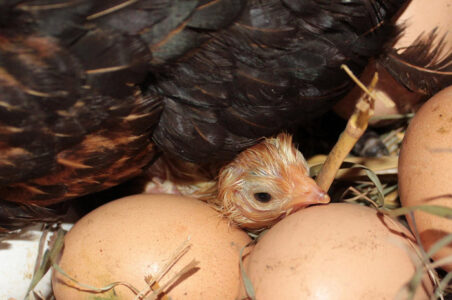Chick pipped, but not hatching? Abandoned eggs? Power outages? Learn what you can do when chick hatching problems arise during incubation and hatching.
Spring is approaching fast, and baby chick season with it. This is an exciting time for every owner of a self-reproducing flock, whether you hatch chicks in an incubator or let your broodies do the job.
As much as we all want the setting and hatching process to go smoothly, it is not for the faint-hearted. Chicks are delicate creatures, and if you hatch any amount of them you are bound to lose some. It is essential to be mentally prepared, as the disappointment can be heart-wrenching, especially if we are talking about pure-bred specimens you have fought tooth and nail to breed, or rare eggs you had barely been able to get your hands on.
In some cases, there is nothing to do but stand back and let nature take its course. Here, however, is a short list of common hatching emergencies which we have encountered over the years as chicken owners, and have been able to solve:
Broody Hen Abandons Eggs
It may happen that one or two eggs hatch later than the others, either because they were added to the clutch later or because they have received, on average, less body heat than their counterparts, which may somewhat slow the hatching process. In this case the broody will sometimes get up from her nest and walk away with the already-hatched chicks, leaving the rest of the eggs to their fate.

It may also be that those eggs are late to hatch because they contain weak or deformed chicks, but if you candle them and see a viable chick, it is worth trying to give them a chance. Your options are:
- Place the eggs in an incubator and, once they hatch, slip the chicks under the mother hen at night to prevent her from pecking them.
- Place the eggs under another broody, and hatch eggs using a surrogate hen.
- If you don’t have either an incubator or another broody, you can try removing the already hatched chicks into a brooder and return broody to the nesting-box, hoping she’ll sit on the eggs again. After successful hatching, reunite the family at night as described above.
Chick Pipped, But Not Hatching
This can be due to a weak chick, wrong positioning, or a particularly hard shell. It can be hard to know when to help a chick hatch. Pay attention! The hatching process can take a varying amount of time and it’s heartbreaking to know in retrospect that you did more harm than good by interference. However, if a chick has pipped a hole in the shell but hasn’t progressed further for 24 hours and you see dried membranes, it may be that a little assistance is needed. Try to carefully moisten the membranes with a wet paper towel. After you’ve done that, gently chip away bits of shell around the egg’s “equator”, imitating the natural hatching process.

Incubator Stops Working
This can be due to a variety of technical reasons, for example a power cut-off. Or maybe the thermostat breaks down at the least opportune moment. We haven’t used our incubator for the past two seasons because we now live in an area with such an unreliable power supply, but once we were in the middle of hatching and our power was cut off for 48 hours due to a big storm. If this happens to you, first off, avoid opening the incubator so as not to let out any heat. After 8 to 12 hours, you will need to think of alternative ways of keeping those precious eggs warm. I actually took the eggs into bed with me, placed them carefully under my clothes and snuggled with them for most of the day. This sounds crazy, I know, but I really wanted those chicks to hatch, and I’m happy to say they did!

To avoid such extremes, have an extra power bank (UPS) into which you can plug your incubator, and/or an emergency generator. If you don’t have one on hand at the moment, place incubator in a small room and heat it as thoroughly as possible (with a gas or wood stove, for example). You might also want to surround the incubator with hot water bottles, just don’t overdo it. Hope for the best; often, even if the eggs cool down for 24 hours or so they will still hatch, only with a delay of a day or two.
The addition of new chicks to the flock is a great adventure, and the thrill you experience once you see a cute baby chick toss aside those shells and emerge into the world more than makes up for the many heart palpitations that precede it.
Anna Twitto’s academic background in nutrition made her care deeply about real food and seek ways to obtain it. Anna and her husband live on a plot of land in Israel. They aim to grow and raise a significant part of their food by maintaining a vegetable garden, keeping a flock of backyard chickens and foraging. Anna’s books are on her Amazon.com Author Page. Connect with Anna on Facebook and read more about her current projects on Domestic Felicity.
All MOTHER EARTH NEWS community bloggers have agreed to follow our Blogging Guidelines, and they are responsible for the accuracy of their posts. To learn more about the author of this post, click on their byline link at the top of the page.




